60+ Actually Good Viking Dog Names
There are many reasons why you might want to name your dog with a Viking (Norse) name. For one, it’s a great way to show off your dog’s heritage. If your dog is descended from a long line of Nordic dogs, then a Viking name is the perfect way to honor that history.
Additionally, Viking names are unique and interesting, which can help your dog stand out from the crowd. And finally, if you’re just a fan of Norse mythology, then naming your dog after a character from those stories can be a fun way to show off your fandom.
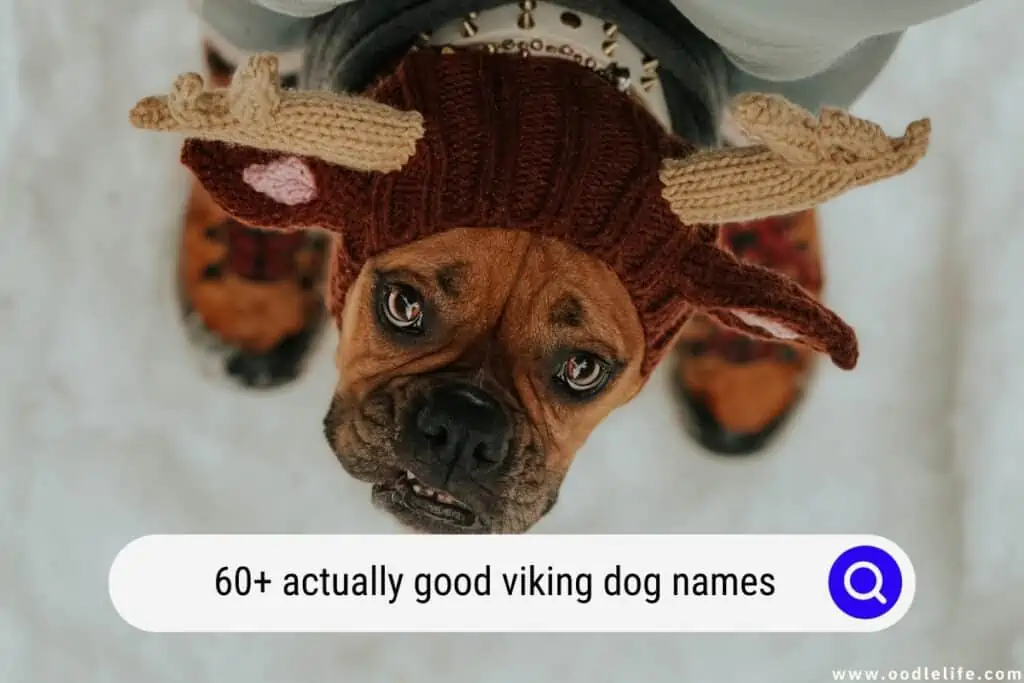
Whatever your reason, Viking names make for great dog names. So if you’re looking for something different and exciting for your pet, consider giving them a Norse twist.
Male Viking Dog Names
If you’re a fan of Norse mythology, you might consider naming your pup after one of the gods or heroes from those stories.
- Baldr: “lord” or “prince.” Baldr was the name of one of the most important Norse Gods in Norse mythology. He was known for his beauty and wisdom.
- Bjorn: “bear.” Bjorn was a popular Viking name, and it’s easy to see why. It conjures up images of strength and power.
- Egil: “edge of the sword.” Egil was a famous Viking warrior known for his skill in battle.
- Fenrir: “fen-dweller.” In Norse mythology, Fenrir was a giant wolf prophesied to kill Odin, the All-Father.
- Freyr: “lord.” Freyr was the name of one of the most important gods in Norse mythology. He was the god of fertility, love, and pleasure.
- Gunnar: “warrior.” Gunnar was a famous Viking warrior known for his skill in battle.
- Harald: “leader of an army.” Harald was a popular Viking name, and it’s easy to see why. It’s the perfect name for a dog who is brave and fearless.
- Loki: “trickster.” Loki was the name of a god in Norse mythology known for his trickery and mischief.
- Magnus: “great.” Magnus was a popular Viking name, and it’s easy to see why. It’s the perfect name for a dog who is strong and powerful.
- Odin: “All-Father.” Odin was the most important god in Norse mythology. He was the god of wisdom, war, and death.
- Ragnar: “warrior.” Ragnar was a famous Viking warrior known for his skill in battle.
- Thor: “thunder.” Thor was the name of one of the most important gods in Norse mythology. He was the god of thunder and storms.
- Tyr: “god of war.” Tyr was the name of a god in Norse mythology known for his bravery and courage.
- Valhalla: “home of the gods.” Valhalla was the name of the afterlife in Norse mythology. It was a place where brave warriors went after they died.
- Vidar: “forest.” Vidar was the name of a god in Norse mythology who was known for his strength and power.
- Grendel: “monster.” Grendel was a monster from Norse mythology who terrorized a kingdom. He was eventually killed by the hero Beowulf.
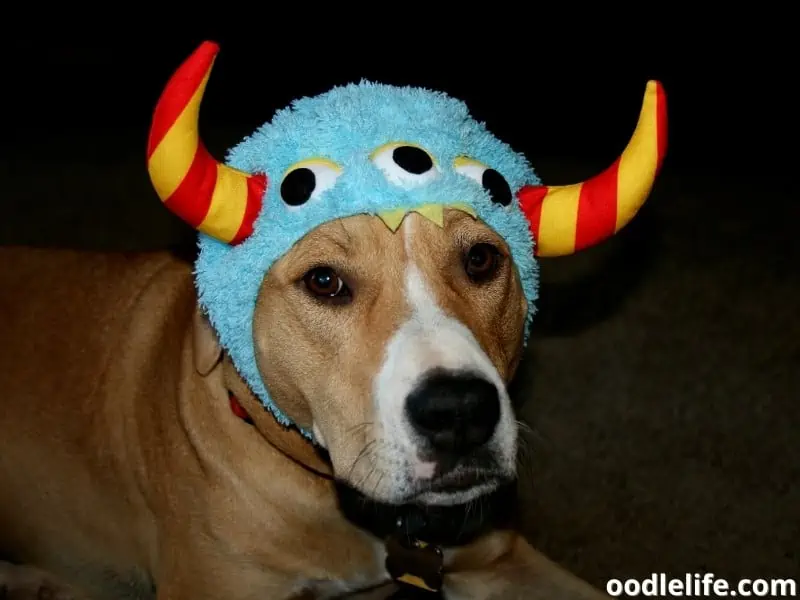
- Hakon: “highborn son.” Hakon was a common name for Viking kings and nobility. It carried with it the connotation of strength and power.
- Helgi: “holy.” Helgi was a popular name for Viking kings and nobles. It was also the name of one of the most famous heroes in Norse mythology.
- Kjell: “shield.” Kjell was a common Viking name, as it signified strength and protection.
- Porridge: “stew.” Porridge was a common food in Viking times, and it was also the name of one of the most famous dogs in Norse mythology.
- Sigurd: “victorious.” Sigurd was one of the most famous heroes in Norse mythology. He was known for his strength and courage in battle.
- Skoll: “treachery.” Skoll was a giant wolf from Norse mythology prophesied to kill Odin, the All-Father.
- Snorri: “magnificent.” Snorri was a common name for Viking kings and nobles. It suggested strength and power.
- Thorfinn: “thunderous.” Thorfinn was a popular name for Viking kings and nobles. It signified strength and power.
- Tord: “edge of the sword.” Tord was a popular Viking name, as it suggested strength and skill in battle.
- Ulf: “wolf.” Ulf was a common name for Viking warriors. It suggested strength and ferocity in battle.
- Valgar: “vulture.” Valgar was a popular Viking name, as it suggested strength and power.
- Vidar: “wide.” Vidar was one of the most important gods in Norse mythology. He was the god of vengeance and protector of mankind.
- Volund: “slayer.” Völund was a famous Viking warrior known for his skill in battle.
- Zorro: “fox.” Zorro was a common name for Viking warriors. It suggested cunning and stealth in battle.
- Falki: “falcon.” Falki was a common name for Viking warriors. It suggested speed and agility in battle.
- Garm: “dog.” Garm was the name of a giant wolf from Norse mythology who guarded the entrance to the underworld.
- Geir: “spear.” Geir was a common name for Viking warriors. It suggested strength and skill in battle.
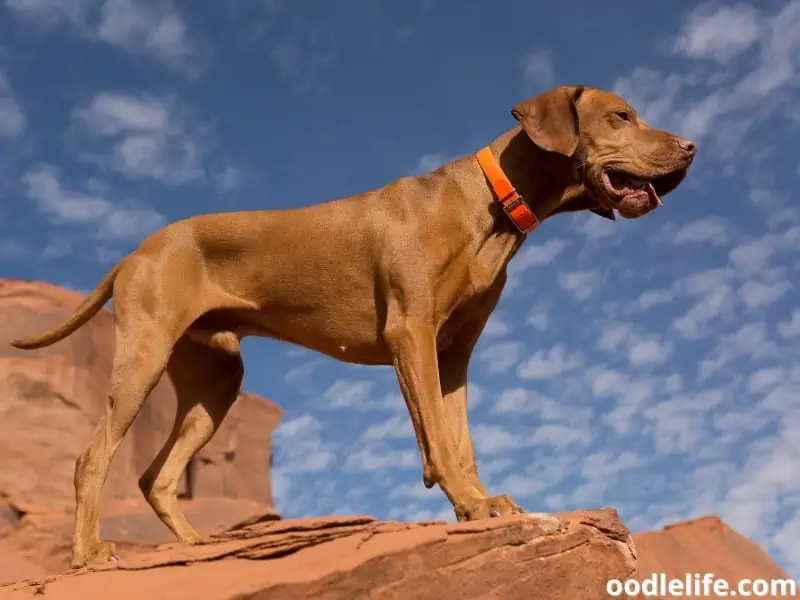
Viking Dog Names for Females
If you’re looking for a strong and regal name for your female dog, consider some of these popular Norse options:
- Astrid: “divine beauty.” Astrid was a popular name for Viking queens and nobles. It suggested beauty and grace.
- Brynhild: “armored warrior.” Brynhild was a famous heroine from Norse mythology. She was known for her strength and courage in battle.
- Freyja: “lady.” Freyja was one of the most important goddesses in Norse mythology. She was the goddess of love, fertility, and beauty.
- Gunnhild: “battle maid.” Gunnhild was a popular name for Viking heroines. It suggested strength and courage in battle.
- Ingrid: “beautiful.” Ingrid was a popular name for Viking queens and nobles. It suggested beauty and grace.
- Ragnhild: “counselor of the gods.” Ragnhild was a popular name for Viking queens and nobles. It suggested wisdom and power.
- Sif: “wife of Thor.” Sif was one of the most important goddesses in Norse mythology. She was the goddess of marriage and fertility.
- Sigrid: “victorious.” Sigrid was a popular name for Viking heroines. It suggested strength and courage in battle.
- Thyra: “protector.” Thyra was a popular name for Viking queens and nobles. It suggested strength and power.
- Valkyrie: “chooser of the slain.” Valkyrie was a group of goddesses from Norse mythology who chose which warriors would die in battle.
- Freydis: “protector.” Freydis was a famous Viking explorer known for her courage and strength.
- Helga: “holy.” Helga was a popular name for Viking queens and nobles. It suggested grace and purity.
- Nanna: “gracious.” Nanna was one of the most important goddesses in Norse mythology. She was the goddess of love and fertility.
- Saga: “storyteller.” Saga was a popular name for Viking queens and nobles. It suggested wisdom and power.
- Signy: “new victory.” Signy was a popular name for Viking heroines. It suggested strength and courage in battle.
- Tanith: “goddess of love.” Tanith was a popular name for Viking heroines. It suggested beauty and grace.
- Valkyrie: “chooser of the slain.” Valkyrie was a popular name for Viking queens and nobles. It suggested strength and power.
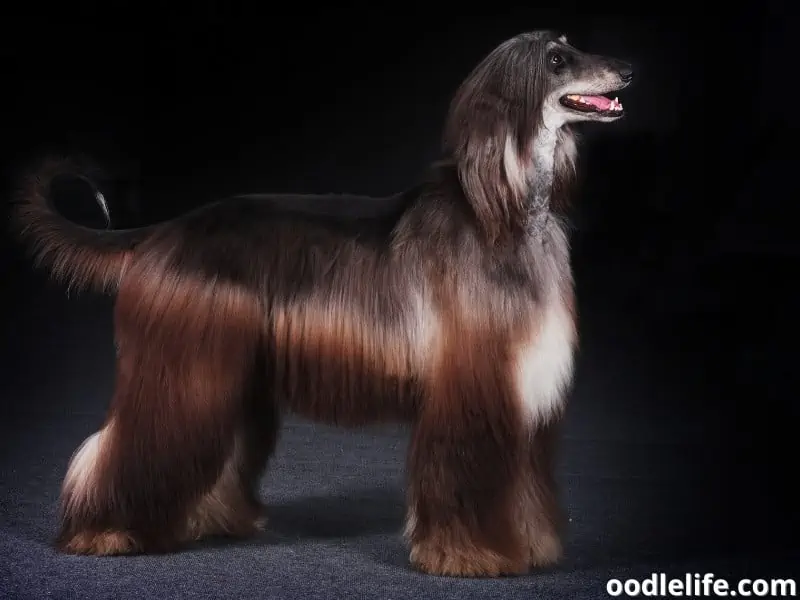
- Estrid: “god-like.” Estrid was a popular name for Viking queens and nobles. It suggested wisdom and power.
- Frigga: “lady.” Frigga was one of the most important goddesses in Norse mythology. She was the goddess of marriage and fertility.
- Gertrude: “spear maiden.” Gertrude was a popular name for Viking heroines. It suggested strength and courage in battle.
- Hilda: “battle maid.” Hilda was a popular name for Viking heroines. It suggested strength and courage in battle.
- Inga: “beautiful.” Inga was a popular name for Viking queens and nobles. It suggested beauty and grace.
- Krista: “follower of Christ.” Krista was a popular name for Viking queens and nobles. It suggested grace and purity.
- Olivia: “elf army.” Olivia was a popular name for Viking queens and nobles. It suggested strength and power.
- Rita: “pearl.” Rita was a popular name for Viking queens and nobles. It suggested beauty and grace.
- Siri: “beautiful woman.” Siri was a popular name for Viking heroines. It suggested beauty and grace.
- Thorhild: “thunder maiden.” Thorhild was a popular name for Viking heroines. It suggested strength and power.
- Tyra: “goddess of war.” Tyra was a popular name for Viking queens and nobles. It suggested strength and power.
- Willa: “helmeted warrior.” Willa was a popular name for Viking heroines. It suggested strength and courage in battle.
- Brynhild: “armored warrior.” Brynhild was a famous heroine from Norse mythology. She was known for her strength and courage in battle.
- Hedin: “warrior of the gods.” Hedin was a popular name for Viking heroes. It suggested strength and power.
- Dahlia: “valley.” Dahlia was a popular name for Viking queens and nobles. It suggested beauty and grace.
- Fiona: “white.” Fiona was a popular name for Viking queens and nobles. It suggested beauty and purity.
- Kara: “brave.” Kara was a popular name for Viking heroines. It suggested strength and courage in battle.
- Liv: “life.” Liv was a popular name for Viking queens and nobles. It suggested life and fertility.
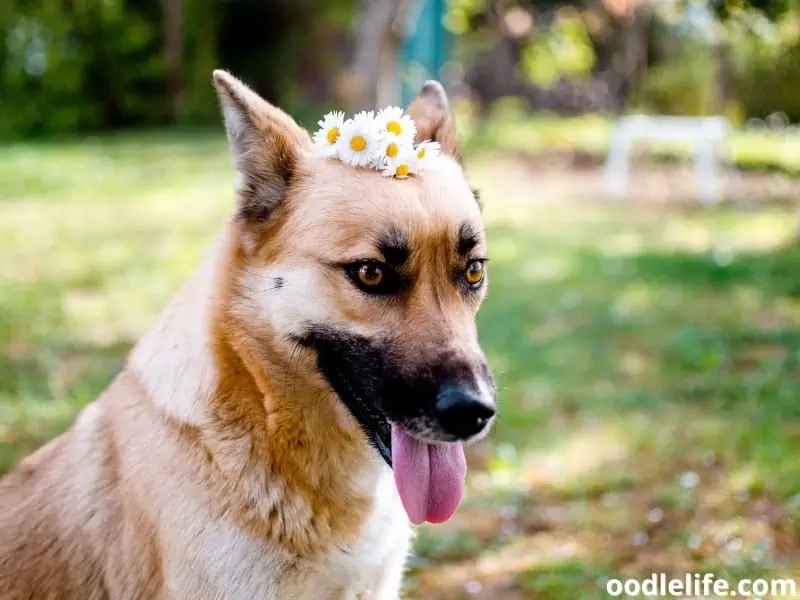
Conclusion
Naming your new dog after a Norse god or goddess is a great way to show your love of mythology. Plus, it’s a fun way to find a unique and meaningful name. There are many beautiful and powerful names to choose from for both male and female dogs.
Whichever name you choose, your dog is sure to be the talk of the town.
So take a look at the list of Norse names above and see if any of them strike your fancy. Your perfect pup is sure to have the perfect name waiting for them!
More actually good dog names